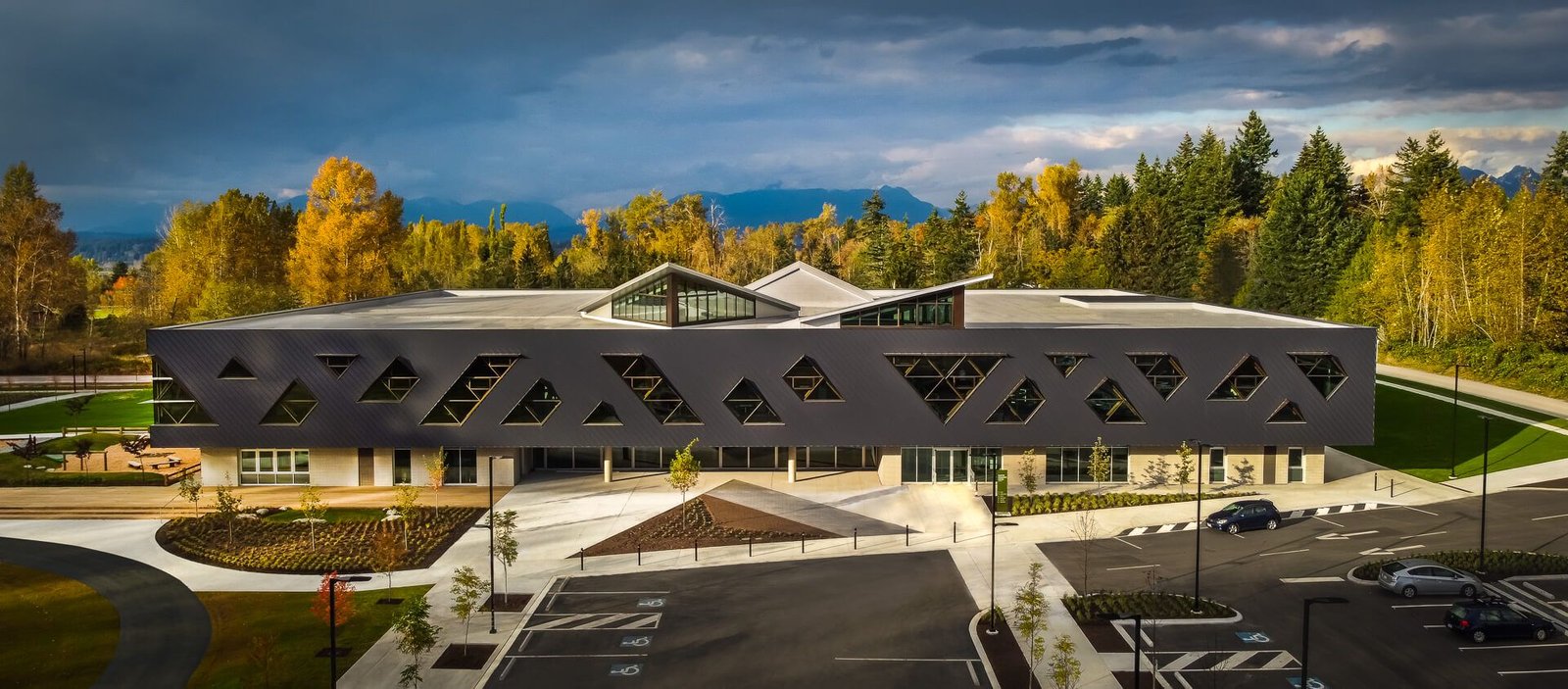This Canadian neighborhood hub is North America’s largest non-residential Passive Home
Following its soft opening in February and a wider official launch this fall, a 76,000-square-foot mass timber community center in the city of Surrey, British Columbia, has been awarded International Passive House certification by the Germany-based Passive House Institute (PHI). Designed by the Vancouver-headquartered hcma Architecture + Design, the socially inclusive and all-under-one-roof Clayton Community Centre, which features a full-service 14,000-square-foot library, fitness and recreation facilities, woodworking studio, and spaces dedicated to the visual and performing arts, ranks as both the first Passive House-certified community center and the largest non-residential Passive House project to achieve certification in North America.
As detailed in an announcement from hcma, the ultra-efficient new building boasts consumes 98 percent less energy compared to the average performance of similar existing buildings in British Columbia and reduced carbon emissions by 98 percent compared to the same building built to standard American Society of Heating, Refrigerating, and Air-Conditioning Engineers (ASHRAE) code. As noted by the firm, building projects awarded with Passive House certification must demonstrate that they consume 70 to 90 percent less energy than conventional buildings while also maximizing occupant comfort. Since 1996, 1774 buildings have been Passive House certified across the globe. Just north of 100 of these projects, mainly single-family homes, are located in the United States, Mexico, and Canada per the Passive House International database.


The firm also notes that in the absence of a recognized independent standard, it developed its “own social impact framework based on principles of equity, social inclusion, security and adaptability.” The project, which broke ground in July 2018, is the “first building to have been completed using the framework from the beginning of the design process,” according to hcma.
“Clayton Community Centre demonstrates what’s possible when we prioritize social outcomes alongside design excellence and ultra-low energy use,” said hcma principal Melissa Higgs in a statement. “We are committed to looking outside ourselves for answers to the rapidly-changing needs of people and spaces. And while it definitely took professional expertise and technical rigor to realize the City of Surrey’s bold vision for this project, we saw the value in opening up the design process to end users to discover the path together. The end result — thanks to the input of these diverse voices — is richer than anything we could have imagined.”
Joining the team at hcma was the London-based MEAD Energy + Architectural Design as Passive House certifier and Passive House consultant Peel Passive House Consulting, based in Toronto.


Located adjacent to and integrated with Clayton Park in Surrey, which is part of the sprawling Metro Vancouver area and the second-most populous city in British Columbia, Clayton Community Centre has been bestowed with at least one major accolade ahead of its Passive House certification. In November, the project received the bronze IOC IAKS Award from the International Olympic Committee (IOC), the International Paralympic Committee (IPC), and the International Association for Sports and Leisure Facilities (IAKS). As noted in a City of Surrey press release, the biennial awards are “the most sought-after prizes for sports, leisure and recreational facilities.”
In addition to the aforementioned public library (the city’s tenth branch location overall), recreational/fitness facilities, and arts-dedicated spaces, the roughly $33.8 million ($43.5 CAD) Clayton Community Centre also boasts a community test kitchen, a quartet of sound-proof music studios, full gymnasium, and a number of outdoor features including a community garden and children’s playground.
“The Clayton community has been eagerly waiting for more recreation, library and arts programming and this new community centre will deliver just that,” said Surrey Mayor Doug McCallum in a statement when the facility made its full public debut in October. “As we continue to invest in infrastructure, this new facility is also championing both sustainable and inclusive design. Clayton Community Centre is fully accessible, uses 90 percent less energy, which helps us to reduce our environmental footprint and generate significant operational cost savings.”


